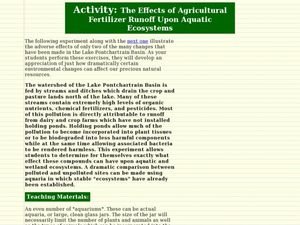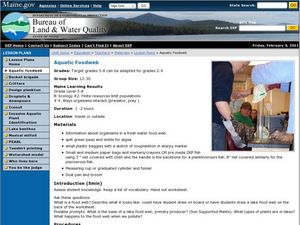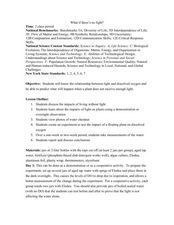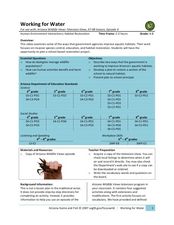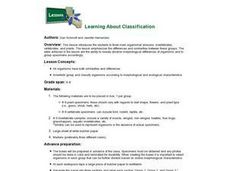Baylor College
Bio Build-up
Trace pollutants through the environment in the seventh lesson of this series on the science of food. Looking at a picture of the plants and animals in an aquatic ecosystem, learners use dot stickers to represent harmful chemicals as...
Curated OER
Turning the Tide on Trash: Marine Debris Curriculum
Six different lessons comprise this unit on marine debris. Science, language arts, social studies, and art projects make this an ideal interdisciplinary unit. The result will be well-informed future citizens who can help make a...
Curated OER
The Effects of Agricultural Fertilizer Runoff Upon Aquatic Ecosystems
Students measure the toxic levels of runoff and discuss the effects it would have on the aquatic system. In this runoff lesson plan, students answer questions to how runoff would affect the animals in an aquatic system.
Curated OER
Aquatic Ecosystems
Ninth graders record information on aquatic ecosystems and create a labeled diagram of an ecosystem of their choice. They can choose from an ocean zone, estuary, river, lakes, or beaches. The student has to explain their biome of choice.
Curated OER
Marine & Aquatic Habitats Activities - Walk in the Wetlands
Students research various types of fresh water wetlands and identify the common animal and plant life in these different ecosystems. They further analyze the need to protect these wetlands and explore their varied uses.
Curated OER
Aquatic Foodweb
Students explore what a food web is. In this science lesson, students examine how nutrients and other pollutants enter a lake and play a food web game whereby students pretend they are either zooplankton, planktivore, piscivore, or...
Curated OER
Forest In A Jar
Students conduct an experiment using soil, water, seeds, a plant, and a jar; and then draw a poster to represent their observations and findings. They make a poster showing what happened to their aquatic environment.
Curated OER
What If There's No Light?
students discuss the importance of light and the consequences of living without it. Using a plant as a demonstration, students predict and observe what happens to a plant when it does not receive enough light. In groups, they experiment...
Curated OER
Photosynthesis: Intake of Carbon Dioxide - Production of Oxygen
Students, after a long-term observation of photosynthesis with aquatic plants, assess the benefits of photosynthesis towards all living organisms. They explain in their own words the two cycles within photosynthesis. Guided discussion...
Curated OER
Plant Lifecycles
Students examine the life cycle of plants. In this plants activity, students identify the various stages of plants and their parts. Students compare the life cycle of a plant with that of an animal. Activities suggested can be modified...
Curated OER
Weave an Aquatic Food Web
Students explore organisms that are part of interconnected food webs. In this food web lesson, students choose an animal and research what the animal eats. Students begin with the food chain and branch out into the interconnected web...
Curated OER
Marine & Aquatic Habitats Activities - Terrestrial Forests vs. Kelp Forests
Middle schoolers discuss concept and specificity of habitats, both marine and terrestrial, list similarities and differences in the habitats of a kelp forest and a terrestrial forest, compare types of organisms that occupy corresponding...
Curated OER
Photosynthesis and Respiration
Pupils comprehend the relationship between plants and animals in an aquatic ecosystem. They predict the effects of low dissolved oxygen on the organisms. Students create microcosms with plants, animals, or both. They determine which...
Curated OER
Oceans in Motion
This simple lesson introduces children to basic marine life as well as to show them the necessity of protecting aquatic environments. Some famous marine life animals are introduced via vocabulary words, then children cut out pictures of...
Curated OER
Plant And Animal Adaptations
Students examine plant and animal life while looking at the environments the organismisms live in. They determine how form follows function by looking an aquatic turtle and noticing its feature of adaptation features. They work in groups...
Curated OER
Working for Water
Learners examine the ways that government works to help improve aquatic habitats. In this water habitats activity students view a video and plan a school restoration project.
Curated OER
Biocomplexity Lab Activity: Measuring Turbidity
Middle schoolers measure turbidity and comprehend the effects of turbidity on aquatic life. They explain what a lake looks like after a heavy rainfall. Students comprehend that turbidity is a measure of the relative clarity of water.
Curated OER
Learning About Classification
Students explore the three main organismal divisions. Students classify organisms by invertebrates, vertebrates, and plants. They observe the differences and similarities between these groups.
Curated OER
Go Fish!
Students are introduced to the culture of the Kumeyaay. Using their text, they discover how they used their native flora and fauna in San Diego. They participate in a matching game and examine the types of organisms who make their home...
Curated OER
Indian River Lagoon
In this science worksheet, learners complete 7 sentences about the Indian River Lagoon. Students also locate 12 words in an estuary word search.
Curated OER
Make Your Own Paper Bag Manatee Puppet
In this science craft worksheet, students learn about the Florida manatee by constructing a paper bag puppet with extra pattern pieces for the head and flippers. Students read the information and study the drawings about manatees, then...
Curated OER
Pond Water Web
Students familiarize themselves with the common organisms that live in a pond and discover their importance in a balanced aquatic habitat as they create food webs. They also investigate how an environmental change affects the habitat as...
Curated OER
Eutrophication Lab
Learners examine the effects of detergents and fertilizers on aquatic life and describe algae. Students define the term eutrophication as the process by which a body of water, such as a pond, lake, stream, or river, has a sudden increase...
Curated OER
Wetland/Estuary Structure and Functions
Students plant wetland plants in aquatic soil and regular soil. They test the effect fertilizers have on each and record the chemicals found in run-off water collected from each soil sample.




